Spotlight on Alumni: Zoie Palmer
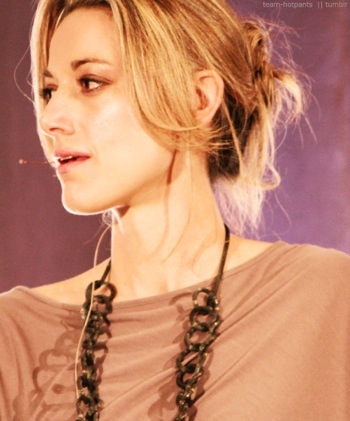 Zoie Palmer
Zoie PalmerWe spoke with Zoie Palmer (BFA 2001) about her work since graduating from the Acting Area in the Dept. of Theatre, and she shares some memories of her time at York.
Since graduating from York University's Fine Arts program in theatre, the journey up to this point has been filled with just about everything. I've experienced the heartache of losing parts to the sheer exhilaration of working with extraordinary actors and directors, all the way to getting roles I could have only dreamed of when I was in theatre school. Its been a full journey and one I am so very grateful for. It may seem strange to be grateful for the disappointment of losing a job you have your heart set on, but for me it has made me who I am, it has made me the actor I am and it has given me the career I have today, so… grateful I am.
I'll give you some of the highlights, those moments since I graduated where I had to pinch myself, turn to the first person I saw on set and shout-whisper, “is this real or am I just drunk and hallucinating?” Working with Christine Lahti in my very first role ever on a movie called Out of the Ashes was nothing short of spectacular. When my agent called and said, “You got the part, it's with Christine Lahti, oh and it's shooting in Lithuania,” I'm pretty sure I passed out while driving to an audition.
I did a movie in Montreal called The Reagans where I worked with Judy Davis and James Brolin, I played their daughter…Judy and James's daughter….amazing!! On the last day of filming Judy Davis was about to leave set for the last time because she had wrapped the movie, I had one scene left to shoot and she walked over to me held my two shaking hands and said, “You have the right heart for this,” and then she hugged me. I just stared at her my eyes as wide as saucers and I squeaked out “thanks” I'm still not entirely sure what she meant but I've never forgotten it. “The right heart for this,” I loved it.
I did two seasons on a show called Instant Star where I played a goth rock musician who had a drinking problem. I had to sing and play guitar, neither of which I did especially well but the producers gave me a chance and I practiced everyday. Thank-you to Stephen Stohn and Linda Schuyler for one of the best jobs I've ever had!
I got my first series lead in a show called The Guard. I remember being on the plane flying to Vancouver and I just kept smiling like an idiot to the poor guy sitting next to me. I'm sure he thought Oh my god seriously, this is a five hour flight!
I once worked with Greg Kinnear in the movie Godsend and M.Night Shyamalan in the movie Devil. I was worried that when I met M. Night (he introduces himself simply as 'Night') I was worried I would just point at him and scream, “You're the writer and director of Sixth Sense!” Gratefully, I did not.
I've also done several guest starring roles on shows like King, XIII, Call Me Fitz, The Listener, Nikita and Murdoch Mysteries. Each of these experiences has taught me something, mostly that something is simply that there are so many talented people in this biz and I'm one lucky so-and-so to have had the opportunity to work with them. I did a movie not long ago called The Untitled Work of Paul Sheppard where I played a porn fluffer, a part that garnered me an Actra nomination. I figured sooner or later it would have to be related to porn for me be nominated. (tee hee)
I've recently finished two movies, one called Cold Blooded, a crime thriller and one called Sex After Kids a comedy, both movies completely different but equally amazing to work on. And finally (can you start a sentence with the word 'and'?) I've just wrapped filming the third season on a show called Lost Girl. It's a fantasy scifi-type show and I play a doctor and scientist to a group of creatures called Fae.
I sometimes feel like the luckiest person alive. I've wanted to act since I was a child and I think there was always this small part of me in a small corner of my brain at the back somewhere that never really believed it would actually happen. It's that part of me now that still whispers to myself on occasion, it's a dream, none of this is real, but until then, I'm just going to remain grateful.
Okay, onto some questions:
What was your favourite place at York, and why?
I had many places I loved at York. I loved the CFT (Centre for Film and Theatre), hanging out there in between class with a coffee and then outside for a smoke where we'd watch people playing hacky sack. (That's when I smoked…I don't now.) I drank more coffee in that four years than I have in the 11 years since. I loved going to the Ab pub and drinking with all the peeps from the Fine Arts program. I loved eating at Blueberry Hill, I'd go there with my bff Sarah Foord and we'd eat chicken fingers and fries with gravy. We'd all go dancing at this place called “The Underground” and since I lived on campus I could stumble home fairly easily….um stumble because I'm clumsy not because I was….never mind. I loved Burton Auditorium, it is this huge theatre and just being inside there made me begin to dream. I'd look up at the ceiling and at all the seats and I'd think, this feels like home to me. I had my very first class ever in Burton Auditorium, it was acting 1010 and it was taught by this incredible woman and teacher Darlene Spencer. One of the luckiest things that ever happened to me was being taught by Darlene, she was and is an exceptional teacher and believed in me as an actor. She is very much part of the reason that I make my living this way today! Even thinking back to that time gives me goosebumps because it was the beginning of my adventure, my journey to now and I was filled with such excitement, such hope. I had no idea where I'd ultimately end up when I began my training but I remember barely being able to contain myself knowing that I would spend the next four years of my life learning to act. I still sometimes can't believe that people are allowed to act for a living and back then I couldn't believe that a person could get a university degree training to become one. Thanks York U for that!
If you had the chance to go back and visit your younger self as you were beginning at York, what advise would you give yourself?
I think I would tell myself to go a little easier on myself, that this is a time of learning not of judging. I remember being hard on myself in theatre school when I didn't feel like I was as good as I should be or as good as other people in my year. Theatre school is this bubble and we assume that whatever goes on in those four years is indicative of how it will all go after, and it's just not necessarily the case. I struggled in theatre school and there were times when I thought perhaps I don't have what it takes to do this for a living. I would love to go back and say, stop worrying about all that, just learn here what you can. I think I would also tell myself that just because something isn't making sense now doesn't mean it never will. There were things I learned about the craft of acting when I was in theatre school that never really made any real sense to me until I was out, until I was in a different place with new people. I'd be on set sometimes going, “Ohhhhhhh, I get it!”
What did you do for the first summer out of the program?
Well I looked for an agent. I didn't get one while I was in school like some people did. I'm sure York still does this now, in our fourth year we would do two big shows and agents would come and watch us and then approach the students who they were interested in repping once we graduated. I was not one such student, I had a little bit of interest but nothing major. I remember being pretty heartbroken about it at the time especially when other actors in my class had interest from agents. I mention this because I suppose I could have decided it meant I wasn't very good or that I wouldn't work once I graduated. Instead I picked myself up and brushed myself off and went and pounded that pavement. I got my head shots and resumes together and made up little packages and I dropped them off at every reputable agency in Toronto. A week later I called and bugged them, and then a week after that and bugged them some more. I kept bugging them until a few of them let me come in for an interview and I finally landed an agent and began to audition. Don't give up. Do not give up, do you hear me?!!
Also that summer I worked in sales for a big recycling company to pay off some debt and then two friends and I got an apartment downtown. My roommates were both aspiring actors too and we all helped each other with auditions and learning lines. We were like The Golden Girls and when one of us lost a job or had a terrible audition we'd sit around the kitchen table and eat and smoke and drink. I loved those two room mates and still do…You know who you are… xox to you both!
I'm very grateful to York University in a lot of ways, my time there, the faculty, and resources York offers are incredible. It was not always easy, in fact some days were harder than I could have ever imagined. I remember whole months when I was so tired from class and rehearsal that I thought I couldn't possibly endure another day. I loved it though, I loved every last second of it, the good and the challenging. It prepared me for what life as an actor is like. Doing a tv series is comparable, in a lot of ways, to that time. We shoot for nearly half a year and it's go go with 16 hour days and then it ends and you wake up one morning and it's over, you're on a break until the next season if there is one. All of this to say thanks York University for an amazing ride, you have a special place in my heart always.
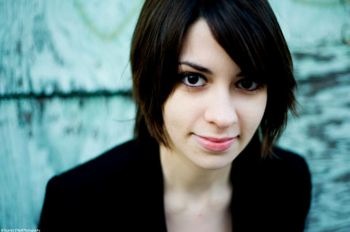 Sarah Thorpe
Sarah Thorpe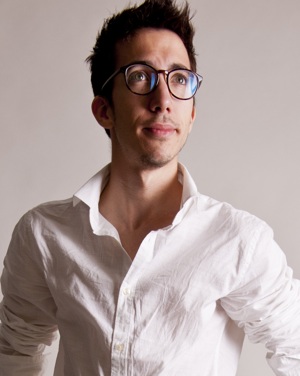 Dan Daley
Dan Daley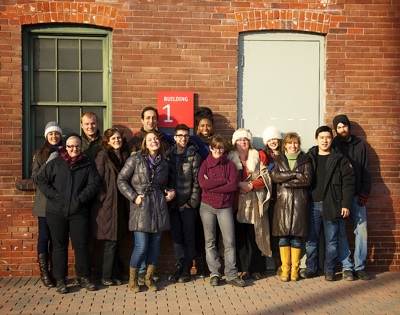 Cast and Crew of The Story 2011 at Evergreen Brickworks
Cast and Crew of The Story 2011 at Evergreen Brickworks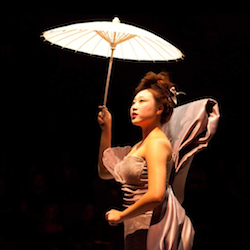 Tina Jung in a costume by Amelia Taverner in Wounds to the Face
Tina Jung in a costume by Amelia Taverner in Wounds to the Face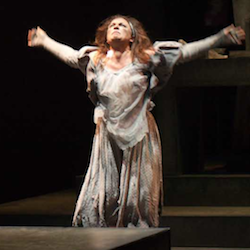 Daniela Pagliarello in a costume by Amelia Taverner in Wounds to the Face
Daniela Pagliarello in a costume by Amelia Taverner in Wounds to the Face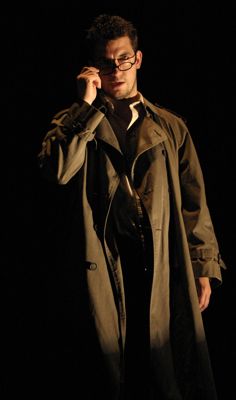 Anthony Black in The Invisible Atom
Anthony Black in The Invisible Atom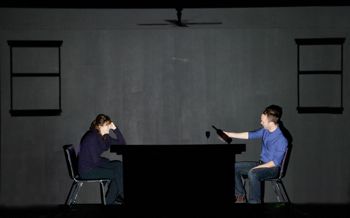 Conor Green and Francine Deschepper in When It Rains
Conor Green and Francine Deschepper in When It Rains Burton Auditorium
Burton Auditorium Weyni Mengesha
Weyni Mengesha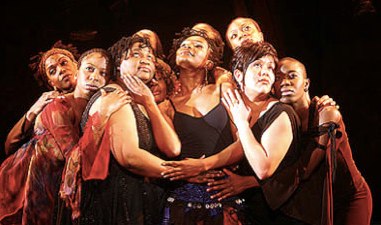 The cast of da kink in my hair
The cast of da kink in my hair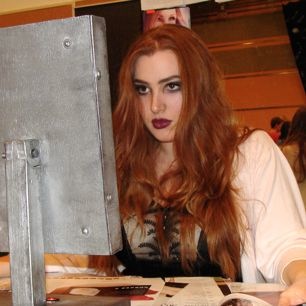 Kayla Childs as the Woman at the Mirror
Kayla Childs as the Woman at the Mirror Sheri Godda and Mishka Thébaud
Sheri Godda and Mishka Thébaud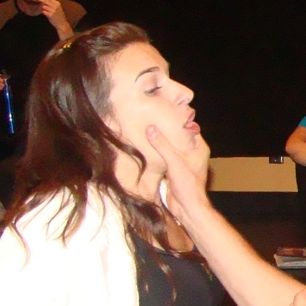 Alexandra Augustine as the Doctor
Alexandra Augustine as the Doctor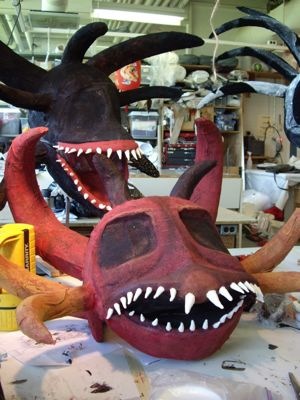 Patrolmen masks from The Odyssey, designed by Katherine Lubienski at Stratford.
Patrolmen masks from The Odyssey, designed by Katherine Lubienski at Stratford. 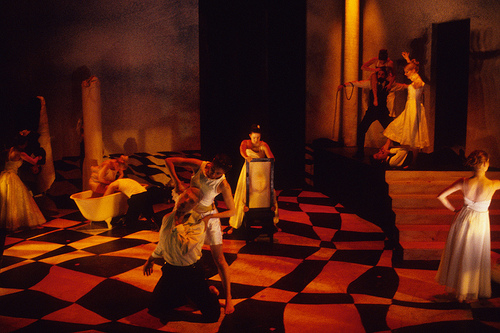 Big Love—Theatre @ York 2003, set design by Michelle Jamieson
Big Love—Theatre @ York 2003, set design by Michelle Jamieson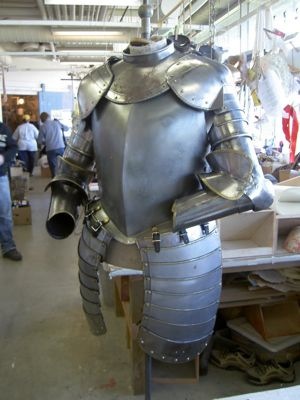 A suit of armour from King Lear at the Stratford Shakespeare Festival designed by Ann Curtis.
A suit of armour from King Lear at the Stratford Shakespeare Festival designed by Ann Curtis.